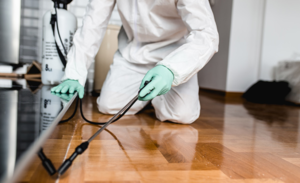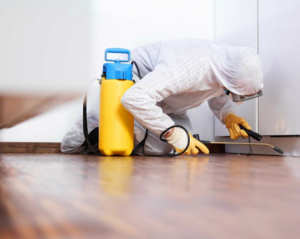Pest control is a key part of maintaining a safe, comfortable home. Standard pest control solutions include traps, baits and sprays. Biological pest control is another option, using microorganisms to control insects.
Adhesive traps are an excellent, low-risk solution that can be placed in high-activity areas. Other pest control options include pyrethrins (derived from chrysanthemum flowers) and pyrethroids, which are synthetic pesticides with enhanced effectiveness. Click the Learn More Here to know more.

As the old saying goes, “Prevention is better than cure.” That’s because preventing pests is far cheaper and more effective than treating them after they show up. Pests are not only annoying, but they can also cause property damage, contaminate food, and even make you sick. Sprague Pest Solutions has been a trusted provider of preventative pest control for nearly a century – a mission we take very seriously and one that continues to drive our company every day.
Preventative pest treatments require fewer chemicals than treatment for infestations, and are usually targeted to specific areas of the home or business. In addition, regular structural assessments can reduce the likelihood of costly repairs due to pest invasions. Caulking cracks and crevices, installing door sweeps, and using steel wool around pipes can help block access to entry points. And taking out trash regularly and knowing your collection day reduces opportunities for pests to get in.
Clutter can provide places for pests to breed and hide, so it’s important to keep food and garbage in sealed containers. It’s also important to wash dishes after every meal and wipe down benches and countertops. Regular rubbish removal can also limit the amount of waste that builds up, as well as reducing pests’ ability to spread diseases and parasites.
Pests can carry pathogens that can make you sick, mainly through bites and droppings. And some, such as cockroaches and bedbugs, produce allergens that can trigger asthma or allergies. Pests can also gnaw through wires and start fires, or contaminate food with their saliva or excrement.
Pests can also be a safety risk, as some are known to carry dangerous diseases like Lyme disease, Zika virus, and rabies. Some can also sting or bite humans, and some, like mosquitoes, can carry viruses that could lead to malaria or dengue fever. Getting regular pest control can greatly reduce the threat of pests and their diseases, making your family or employees safe. And if you’re a business owner, pest prevention can improve your reputation and customer experience, as well as protecting your assets and bottom line.
Pests Can Make You Sick
Pests can carry diseases and germs that can make you sick, causing illness from bites or stings, as well as illnesses from ingesting the pests’ droppings or urine. The most common pests that cause illness are mice, rats, spiders, fleas, cockroaches, and flies. These pests spread harmful bacteria such as E.coli and salmonella from their fur, feet, droppings, saliva, or even through the skin of people or animals they come into contact with.
Some pests also carry a lot of allergens which can trigger asthma or other respiratory issues in sensitive individuals. Other pests, like roaches and bed bugs, carry mites that can aggravate allergic reactions in many people. And, while most spider bites are not dangerous, some (like the Brown Recluse or Black Widow) can be fatal.
Rodents like mice and rats are terrifying to homeowners because of their size, but they also can carry serious diseases from their droppings or contaminated water. They can also cause fires by chewing through wires, as well as damage homes with their gnawing.
Fleas and flies are annoying, but they also can be deadly to pets and humans. Fleas can transmit tapeworms and other parasites that affect human health, while flies can carry diseases such as salmonella and E.coli, as well as rotavirus in young children.
In addition, rodents and other pests often contaminate food with their urine, feces, or saliva, which can lead to food poisoning. This can be a huge problem for restaurants and other businesses that sell food.
Prevention is key when it comes to pests. Regular cleaning, proper food storage, and sealing entry points will all help keep pests away from your home or business. Also, hiring a pest control company with experience is important, as they will likely have seen a lot of different scenarios and have a plan to deal with them effectively. A good pest control company can offer a variety of methods to prevent infestations, including physical exclusion and chemical applications. The most experienced companies can tailor their services to your specific needs, which will protect you and your property more effectively.
Pests Can Damage Your Home
While pests may seem to be insignificant, their presence in your home can cause significant damage. Pests may also carry and transmit diseases to humans and animals. They can contaminate food and surfaces with bacteria, pathogens, and allergens. They can weaken structures through gnawing and chewing. And, depending on the pest, they can also wreak havoc with major household systems and appliances, leading to costly repairs or replacements. Additionally, pests can cause health problems in susceptible individuals through their droppings, bites, or saliva.
Infestations of pests can be difficult to detect until the damage has already occurred. However, a few basic DIY pest control methods can help you avoid or identify signs of infestations.
Structural Damage
Termites, carpenter ants, and certain beetles can eat away at wood structures. Their damage can threaten the structural integrity of your home. If left unchecked, these pests can cost you thousands in repairs.
Contamination of Food and Surfaces
Ants, flies, and rodents can contaminate food and surfaces with bacteria, viruses, and other harmful microorganisms. Their droppings can also aggravate allergies and asthma symptoms in susceptible people.
Electrical Hazards
Rodents, especially mice and rats, have a habit of chewing on electrical wires. This can lead to short circuits and even electrical fires. In addition, rodents can chew through and cause damage to ductwork and air conditioning systems.
Paper Pests
Pests like moths, silverfish, and beetles love paper as a source of food. If you have a lot of stored paper in your home, make sure to check for evidence of these pests regularly. If you find it, take measures to keep them away from your books and papers. These include sealing gaps around piping and wiring, keeping garbage cans tightly sealed, and eliminating any stacks of paper on your shelves.
Preventative pest control includes regular cleaning, proper sanitation, and reducing moisture in your home. A professional pest control company can also provide you with advice on preventative strategies. However, if you have a severe pest infestation that isn’t going away on its own, it is best to call an exterminator.
Pests Can Be Expensive
One of the primary factors that determines how much a pest control specialist charges is the type and severity of the infestation. For instance, treating a home or business for termites and other wood-destroying insects can be significantly more expensive than dealing with cockroaches, rodents and other common pests. The size of the structure also has an effect on treatment costs. Larger homes and businesses are typically more challenging to treat because they contain more nooks, crannies and crevices where pests can hide.
The length of the pest control process can also add to your bill. Infestations that are widespread or deeply rooted may require multiple treatments before they are eradicated. Likewise, more thorough treatment options, such as baiting and use of heat or cold to exterminate the pests, may take longer than less effective methods.
A history of pest infestation can also reduce the resale value of a property. Potential buyers will be wary of a home or business with signs of unwelcome guests, which can lead to lengthy negotiations or even a failed sale. Taking preventive measures, including hiring a professional for regular pest control services, can ensure that the property is sold at a fair price.
Indirect costs associated with pests are often overlooked, but they can add up quickly and can be just as costly as the physical damage caused by unwelcome critters. For example, pests like rats and roaches can spread dangerous diseases, and their feces can trigger asthma attacks and allergies in children and adults. This can lead to more frequent doctor visits, higher prescription medication costs and even hospitalizations.
In addition, a pest problem can hurt a business’s reputation. Employees and customers will be reluctant to spend time in a shop or office that appears dirty or unhealthy, which can result in lost revenue. In fact, one study found that a single pest infestation can cost an average company $6,889 in losses. This is on top of the loss of sales and a bad name. A company that prioritizes preventive pest control services can avoid these costs and protect its bottom line.


